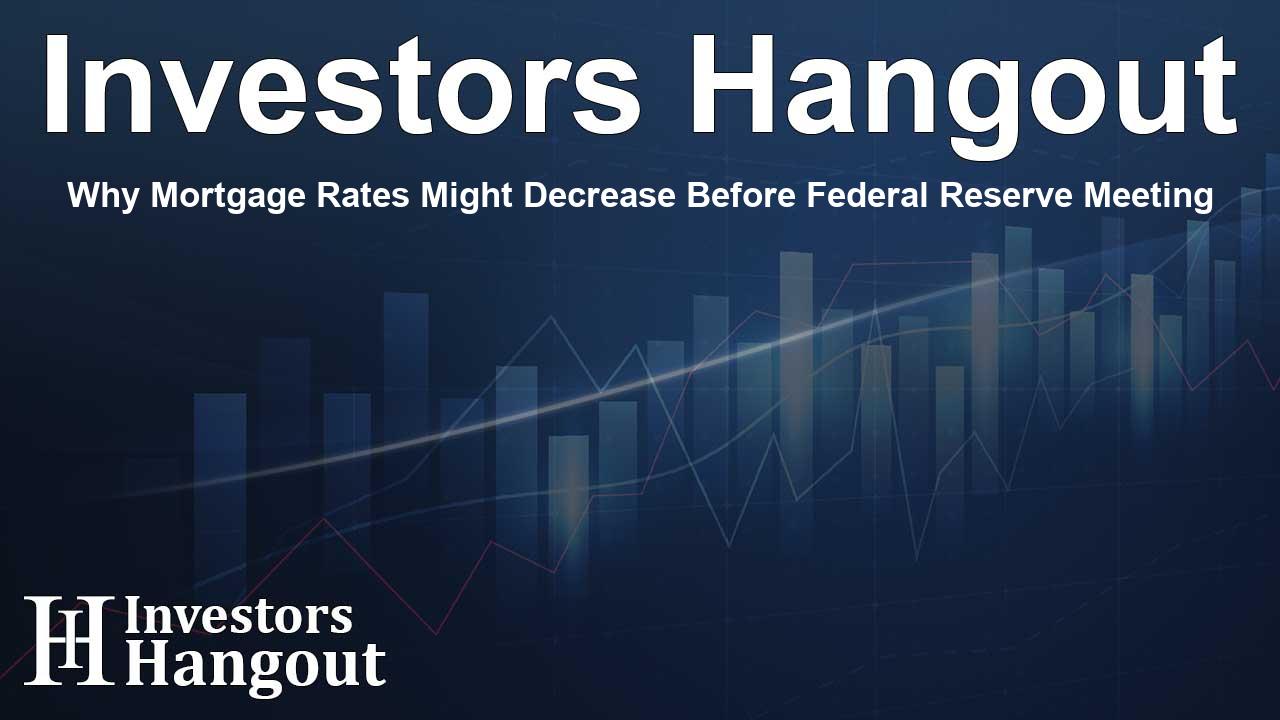Why Mortgage Rates Might Decrease Before Federal Reserve Meeting

Anticipated Mortgage Rate Trends Ahead of Federal Reserve Meeting
As we look into the near future, there's a palpable sense of expectation among financial experts about possible fluctuations in mortgage rates. Lenders often react ahead of rate cuts by the Federal Reserve, which is expected to make key decisions that could influence the mortgage market profoundly.
Market Expectations Point to a Federal Reserve Rate Cut
Current financial models, particularly the CME Group’s FedWatch tool, indicate that market participants are bracing for the first rate reduction in 2025 around a crucial two-day meeting scheduled for mid-September. With odds favoring this cut extremely high, lenders may begin adjusting their offers downward even before Chair Jerome Powell formally announces policy changes.
Understanding Mortgage Rates and Treasury Yields
While it might seem that the Federal Reserve's actions directly govern mortgage rates, the reality is more intricate. Fixed mortgage rates generally align with the 10-year Treasury yield, which reflects broader investor sentiment. When bond yields decline, often due to reduced inflation expectations or growing recessionary fears, mortgage rates typically follow suit, sometimes even anticipating these changes.
Historical Context Supports Current Rate Trends
Looking at recent trends provides insight. In a similar scenario last year, a surprising 50-basis-point cut by the Federal Reserve coincided with a significant drop in mortgage rates, which had already been trending downward ahead of the announcement. This trend suggests that borrowers may find favorable rates before any official announcements are made.
Current Market Dynamics and Buyer Strategies
In light of 2025’s trends, Freddie Mac's latest survey illustrates a decline in the 30-year mortgage rate, dropping from 7.04% to 6.56%, equating to a 10-month low. This reduction is enticing more potential buyers and refinancing candidates to engage with the market rather than sit on the sidelines.
For those contemplating home purchases, the current market strategy is to enter if the payment aligns with their budget. Knowing that refinancing could be an option later if rates continue to decline makes this a pragmatic approach. Recent reports indicate that refinancing activity is indeed beginning to thaw as rates decrease, hinting that lenders are preparing for competition regardless of the timing of cuts.
What Could Affect Future Rate Movements?
Factors that may expedite reductions in rates include drops in the 10-year Treasury yield or a tightening mortgage-Treasury spread as volatility dissipates. However, it’s important to remain cautious; any sudden spikes in yields could rapidly reverse current positive trends.
Ultimately, the mortgage market is shaped by a complex interplay of economic indicators and investor sentiment. Understanding these dynamics can empower borrowers to make informed decisions about home buying and refinancing.
Frequently Asked Questions
What is the connection between mortgage rates and the Federal Reserve?
The Federal Reserve influences short-term interest rates, which can impact mortgage lending indirectly as lenders often adjust rates based on longer-term Treasury yields, reflecting broader economic sentiments.
Why do mortgage rates decrease before Fed announcements?
Lenders anticipate Fed decisions based on market conditions and may adjust mortgage rates downwards in advance of official announcements when they expect cuts.
What historical trends support current mortgage predictions?
Recent instances show that mortgage rates often decline prior to unexpected Federal Reserve moves, as was seen following a notable cut last year.
How should potential homebuyers approach the current market?
Buyers should assess their financial capabilities and consider entering the market now, with the option to refinance later if rates drop further, making it a strategic move.
What external factors can influence future mortgage rates?
External elements such as inflation data, economic forecasts, and Treasury yields can significantly affect mortgage rates, contributing to volatility in the housing market.
About The Author
Contact Owen Jenkins privately here. Or send an email with ATTN: Owen Jenkins as the subject to contact@investorshangout.com.
About Investors Hangout
Investors Hangout is a leading online stock forum for financial discussion and learning, offering a wide range of free tools and resources. It draws in traders of all levels, who exchange market knowledge, investigate trading tactics, and keep an eye on industry developments in real time. Featuring financial articles, stock message boards, quotes, charts, company profiles, and live news updates. Through cooperative learning and a wealth of informational resources, it helps users from novices creating their first portfolios to experts honing their techniques. Join Investors Hangout today: https://investorshangout.com/
The content of this article is based on factual, publicly available information and does not represent legal, financial, or investment advice. Investors Hangout does not offer financial advice, and the author is not a licensed financial advisor. Consult a qualified advisor before making any financial or investment decisions based on this article. This article should not be considered advice to purchase, sell, or hold any securities or other investments. If any of the material provided here is inaccurate, please contact us for corrections.
